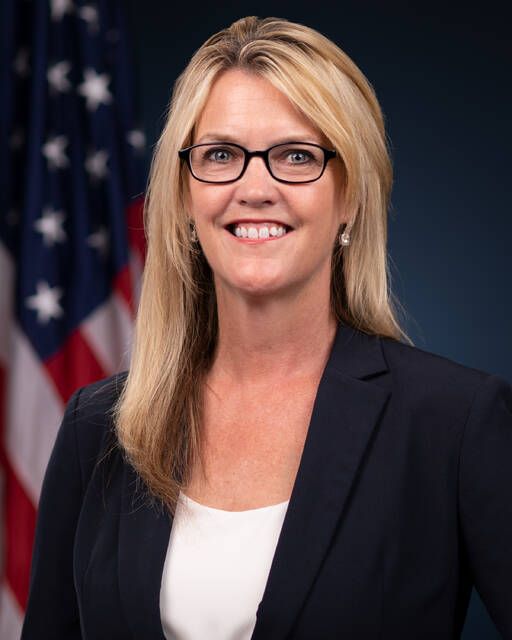Click here to subscribe today or Login.
WILKES-BARRE — Pennsylvania Department of Labor & Industry (L&I) Secretary Jennifer Berrier this week joined the owners of Knead Pizza and Elementary Coffee at Harrisburg’s Broad Street Market to highlight Gov. Tom Wolf’s minimum wage proposal and share the real-life impacts a higher minimum wage would have on thousands of workers and their families.
“For too long, Pennsylvania’s lowest-paid workers have faced an insurmountable challenge: working longer and longer hours at a wage the General Assembly has not voted to increase since 2006,” said Berrier. “As inflation soars, and the prices of everyday essentials skyrocket, our minimum wage has remained stagnant. We simply cannot accept the fact that some employers continue to choose to pay workers just $7.25 an hour, which is not enough income to sustain a single person, let alone a family. I applaud businesses like Knead Pizza and Elementary Coffee that are investing in Pennsylvania families and building successful businesses by paying their workers a living wage.”
Gov. Wolf’s plan proposes raising Pennsylvania’s minimum wage to $12 per hour by July 1, 2022, with a pathway to $15 per hour by 2028. The proposal will help workers recover the purchasing power lost since the minimum wage was set at $7.25 per hour to match the federal minimum wage more than a decade ago.
According to the Keystone Research Center, if the minimum wage had kept pace with productivity growth since the late 1960s, it would be more than $24 per hour today in Pennsylvania.
Berrier met with Knead Pizza owner Jennie O’Neill and Elementary Coffee owner Andrea Grove-Musselman, and spoke with employees as they prepared various foods and drinks.
O’Neill and Grove-Musselman joined Berrier in the call for movement on Pennsylvania’s minimum wage and shared how a higher wage benefits their employees as well as the company.
“The past few years have been incredibly unpredictable and raising our starting wage to $15 per hour created stability for our company and our team,” said O’Neill. “The higher wage allows us to attract talented people and hold on to them longer. Seventy-five percent of our team has been with us for at least one year.”
Thirty states, including all of Pennsylvania’s neighbors, have a higher minimum wage than $7.25 an hour. Polls show the public strongly supports increasing the minimum wage. Over the past two decades, there have been ballot referendums to raise the minimum wage in 20 states, most recently in Florida — every one has passed. It is estimated that approximately 42%of the U.S. workforce will earn at least $15 an hour by 2026.
If the legislature were to take action to increase Pennsylvania’s minimum wage, more than 618,400 women would get a direct pay increase — nearly 21% of all women working in the commonwealth. With most low-paying jobs held by women in Pennsylvania, our current minimum wage only promises to further worsen the gender pay gap.
Legislative action on Governor Wolf’s proposal would also directly benefit 26.2% of persons of color, including:
• 31.9 percent of Hispanic workers
• 26.3 percent of Black (non-Hispanic) workers
• 15.7 percent Asian (non-Hispanic) workers
• 25.8 percent of other races/ethnicities
Kosierowski named to House Appropriations Committee
State Rep. Bridget M. Kosierowski, D-Waverly, announced this week that she has been appointed to serve on the House Appropriations Committee. The committee provides oversight and offers recommendations for budget/fiscal-related matters and is integrally involved in the annual budget process.
“This appointment is a great honor,” Kosierowski said. “It is one that also comes with an important responsibility. Not only will I continue advocating for my district during the annual budgeting process, but I’ll also be better positioned to review fiscal policies and their direct implications to hard-working taxpayers across the Commonwealth.”
In addition to the Appropriations Committee, Kosierowski also serves on the House Health, Insurance, Policy and Professional Licensure committees. All five committees hear testimony and review legislation related to their respective topic area before being voted on by the entire House, thus aiding the creation and implementation of state policy in these areas.
A member of the Northeast Delegation, she is also a member of multiple caucuses, including LGBTQ Equality, PA SAFE, Women’s and Women’s Health.
In addition to her role as a legislator, Kosierowski, was appointed to the Pennsylvania COVID-19 Vaccine Task Force. In that role, she helped ensure essential workers were provided earlier access to vaccinations, as well as on-site clinics at the workplace. She was honored by the United Food and Commercial Workers Union 1176 in October 2021 for her advocacy and efforts to advance legislation that prioritized health and safety initiatives for essential workers throughout the pandemic.
DMVA virtual town hall on serving older veterans
The Pennsylvania Department of Military and Veterans Affairs (DMVA) will host the second in a five-part series of virtual Veteran Town Halls on May 18, from 5 p.m.-6:30 p.m.
The town hall will focus on serving older veterans.
Please join Robert Torres, secretary, Pennsylvania Department of Aging; Brig. Gen. (PA) Maureen Weigl, DMVA deputy adjutant general for Veterans Affairs; and Travis Davis, DMVA executive director for Long-Term Care. Discussion topics will include DMVA veterans homes, the Pennsylvania Department of Aging’s Caregiver Support Program, senior centers, accessing nutritional programs and recognizing abuse/neglect/exploitation of the elderly.
Attendees can participate by using this Microsoft Teams link. Participants will have the opportunity to ask questions of the presenters live during the program through the chat feature.
“We are looking forward to helping older veterans safely navigate the next phase of their lives,” Weigl said. “We all age, but veterans often face unique health and social challenges based on their service and sacrifice to our nation. This forum will give veterans the information they need to care for their health, protect their financial resources and live a quality life for years to come.”
“It is important that older veterans know there are many services and programs that can benefit them, especially since we owe them a debt of gratitude and support for their invaluable service to our country,” Torres said.
The town hall series provides the commonwealth’s nearly 800,000 veterans with a convenient platform to learn and ask questions about programs and services earned through their military service.
The following are the dates, times and topics for the three remaining 2022 Virtual Veteran Town Hall events:
• July 13, 2022, 5-6:30 p.m. – Resources for Homeless Veterans
• Sept. 14, 2022, 5-6:30 p.m. – Transportation Issues Facing Veterans
• Nov. 2, 2022, 5-6:30 p.m. – Honoring Veterans for Their Service and Sacrifice
Deadline to apply for mail-in ballot for May primary is May 10
Acting Secretary of State Leigh M. Chapman is urging Pennsylvanians planning to vote by mail ballot in the primary election to apply now, before the May 10 deadline, and return their mail ballot immediately to ensure their vote is counted.
“With just one week to go to the deadline, apply online today so your county board of elections can send your mail ballot in time for you to fill it out and return it by the Election Night deadline,” Chapman said. “Voters also have the convenient option of applying for a mail ballot in person at their county board of elections office, then completing the ballot while there. In one visit, voters can apply for and cast their mail ballot. That option is available until May 10.”
To date, more than 771,600 Pennsylvanians have applied for a mail-in ballot and more than 90,200 Pennsylvanians have applied for an absentee ballot to vote in the primary.
Whether completing the mail ballot at home or at their county board of elections office, voters should read all instructions carefully and follow these steps to ensure their ballot is counted:
• Enclose the mail ballot in the inner security envelope marked “official election ballot” and seal it, being careful not to make any stray marks on the envelope.
• Seal the inner security envelope in the pre-addressed outer envelope.
• Sign and date the voter’s declaration on the outer envelope.
• Voters should return their voted ballot to their county board of elections as soon as possible. They have two options:
• Mail the ballot. Mailed ballots must be received by 8 p.m. May 17, Election Day. Mail ballots received after that time will not count, even if postmarked by 8 p.m. May 17.
• Hand-deliver their ballot to their county elections office, officially designated satellite office or drop box site. Hand-delivered ballots must be received by 8 p.m. May 17.
• Voters may return only their own mail ballot unless the voter has a disability and designates someone in writing to return it for them using the designation form on the Department of State website, or the voter requires an emergency absentee ballot.
Reach Bill O’Boyle at 570-991-6118 or on Twitter @TLBillOBoyle.












